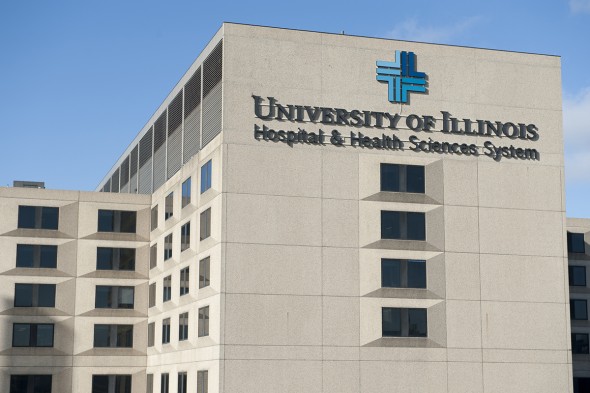Trustees set to vote on UI Health reorganization March 6

“This is the right move at the right time,” interim vice president Jerry Bauman says of the reorganization plan. Photo: Roberta Dupuis-Devlin/UIC Photo Services
A reorganization plan that would unite the University of Illinois Hospital and clinics with academic health science colleges in Chicago to better serve the state’s health care needs would be implemented by early 2015 under a proposal that will be considered next week by the university’s Board of Trustees.
In November, trustees endorsed the concept of aligning health-related academic and clinical enterprises at the university’s Chicago campus under a single umbrella.
The board asked University of Illinois President Robert Easter to develop implementation plans addressing details such as lines of authority, job descriptions and other organizational issues.
Final plans for the proposed reorganization were reviewed Monday by the board’s University Healthcare System Committee, and will go to the full board at its March 6 meeting on the Urbana-Champaign campus.
“The new organizational structure would pool our vast clinical and academic resources in pursuit of critical, life-changing goals — advancing patient care, teaching and research discovery to serve the rapidly changing health care needs of our state and our nation,” Easter said.
If the board approves the plan, ongoing efforts to transform the university’s health care enterprise would continue until the realignment can be fully implemented with the hiring of a vice chancellor for health affairs at UIC to oversee the new, unified organization.
Currently, college deans report to the UIC provost, while the Chicago hospital and clinics are administered by a university-level vice president for health affairs, a position that would be eliminated. Those lines of authority would continue until a vice chancellor is hired.
The new vice chancellor at UIC would direct all clinical and health-related academic programs and report to the UIC chancellor.
The proposal calls for the president to continue leadership and oversight in health affairs by meeting regularly with the new vice chancellor, UIC’s chancellor and provost, and the university’s chief financial officer.
Under current plans, a search to fill the new position would begin later this year with a vice chancellor could be hired by early 2015, said Avijit Ghosh, senior adviser to the president and business administration professor who helped develop the reorganization plan.
The search would be delayed slightly to coordinate with another search that will begin this spring to replace UIC Chancellor Paula Allen-Meares when her term ends in January 2015.
Her replacement is expected to be named by fall; officials hope to give the new chancellor a voice in the vice chancellor’s hiring because the two administrators would work together closely to guide clinical and academic programs that comprise more than 60 percent of UIC’s $2 billion budget.
Easter recommended the new organizational structure after months of study that included discussions among administrators, faculty and staff; a day-long board retreat that brought in experts from around the country; and input from the Huron Group, a global management consulting company.
The reorganization received widespread support, including endorsements from the deans of the seven health science colleges, support from campus committees appointed by Allen-Meares, and the UIC Senate Executive Committee.
The realignment was also supported by the University Senates Conference, which includes faculty senate leaders from the university’s three campuses.
“This is the right move at the right time, and will position the University of Illinois as a leader in health care,” said Jerry Bauman, interim vice president for health affairs.
“The proposed reorganization structure is very sensitive to aligning the academic and clinical missions of our colleges while at the same time maintaining a sense of community as a comprehensive university.”
Under the realignment, the new vice chancellor for health affairs would oversee a hospital and about a dozen federally qualified clinics that receive more than 400,000 patients visits a year, along with the seven academic units — the colleges of Applied Health Sciences, Dentistry, Medicine, Nursing, Pharmacy and Social Work and the School of Public Health — and regional campuses of those units.
The proposed reorganization would create a unified health care enterprise that integrates teaching and research into clinical care. UIC is one of the few universities in the nation with the full complement of health science colleges and the proposed realignment would create opportunities for collaborations among the colleges in clinical settings.
Officials say the new alignment would make the university’s health care enterprise more nimble and efficient amid rapid changes in the nation’s health care landscape, from new medical technologies and insurance regulations to the implementation of the Affordable Care Act.
“Clinical and academic enterprises have functioned independently, each with their own strategies and priorities,” Ghosh said.
“The proposed reorganization would put everyone on the same page, with common goals and a single person responsible for ensuring that we achieve them.”
The new vice chancellor would be responsible for working with clinical and academic staff to develop a comprehensive health care strategy for the university, establishing goals for each unit and working with administrators to implement them.
The vice chancellor would facilitate opportunities for collaboration with other units at UIC and the campuses at Urbana-Champaign and Springfield.
